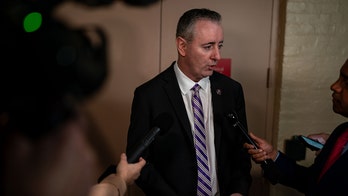As a potential federal government shutdown looms, there are parallel efforts underway -- one to figure out how to reach an agreement, and another to cast blame in case there isn't one.
And as both parties focused on a temporary measure to avoid a shutdown, lawmakers were already pointing fingers.
“This is no longer about budget issues it's about bumper stickers,” Sen. Dick Durbin, D-Ill., said.
Sen. Chuck Schumer, D-N.Y., echoed the sentiment that if there is a shutdown, it won’t be because of budget issues.
“It would be a tragic mistake to force a government shutdown, but doubly tragic if the shutdown were on issues not related to spending,” Schumer said.
Democrats argue this is no longer a fight over numbers but rather about ideology, an attempt to blame the Tea Party. As evidence, Democrats point to a rider in the temporary extension of spending that would outlaw federal funds for abortions in Washington, D.C. which they say they cannot support.
But Republican leader Mitch McConnell dismissed that as an attempt to shift blame, claiming Senate Majority Leader Reid, D-Nev., Durbin and even the president have embraced the very same language before.
The policy prescriptions it contains have been previously agreed to by Democratic leaders and signed by this president,” he said.
McConnell charges that if a shutdown does occur, Democrats would have "no one to blame but themselves."
During the federal government shutdowns in the mid-1990's under President Clinton, then House Speaker Newt Gingrich and the Republicans were blamed by a two to one margin.
But a lot has changed since then, in part because the deficits are now so much larger.
Ernest Istook, a distinguished fellow in government studies at the Heritage Foundation, was a Republican congressman from Oklahoma during the last shutdown and he notes how the tone in Washington has changed.
“We have a very different political environment than we did in 95 and 96. Just look at the emergence of the Tea Party and the number of people all across the country who are saying, 'get control of spending, stop all the borrowing, stop all the spending.’”
And that may be why the public has a very different view today.
A recent Washington Post poll asked who should be blamed in the case of a shutdown. Thirty-seven percent blamed Republicans and 37 percent blamed the Administration. Another 15 percent blamed both equally.
And Republicans were careful today to mention the White House role.
“The White House has been late in coming to the aid of their party,” said House Appropriations Chairman Hal Rogers, R-Ky. “The White House has been absent from the battle until the last few days.”
So the current situation is very different from the 1990's, with lawmakers in both parties now acknowledging that something has to be done about spending.
In fact, deficits were a major reason Democrats lost control of the House in the last election.
That may be why polls this time show no clear advantage to anyone from a shutdown, making the blame game harder to play.




